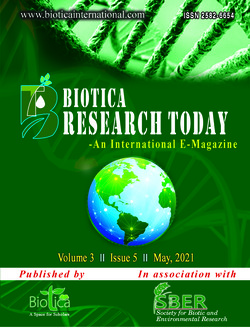
Climate Change and Crop Stresses
Merentoshi*
Dept. of Genetics and Plant Breeding, School of Agricultural Sciences and Rural Development (SASRD), Nagaland University, Medziphema, Nagaland (797 106), India
Ranjan Das
Dept. of Crop Physiology, Assam Agricultural University, Jorhat, Assam (785 013), India
Lanunola Tzudir
Dept. of Agronomy, School of Agricultural Sciences and Rural Development (SASRD), Nagaland University, Medziphema, Nagaland (797 106), India
DOI: NIL
Keywords: Abiotic stress, Climate change, Food security, Yield loss
Abstract
In recent years climate change has brought about drastic changes in agro-climatic conditions resulting in posing a constant threat to crop production by environmental stresses. Among various environmental conditions including biotic and abiotic stresses play an important role in reducing crop productivity. Abiotic stresses cause higher crop loss as compared to biotic stress. Although a lot of studies have been conducted in plant stress research, it is of major importance for researchers to look for good adaption strategies as different abiotic stresses arise together in the field. These stresses have a detrimental effect on farmer’s subsistence as well as the national economies and together with the current pandemic situation the global food security is put under threat.
Downloads
not found
Reference
Bayer Crop Science, 2008. “We need a second green revolution” – Safeguarding food for a growing world population. http://www.seedquest.com/News/releases/2008/october/23973.htm
FAO, IFAD, UNICEF, WFP, WHO, 2020. The State of Food Security and Nutrition in the World 2020. Transforming food systems for affordable healthy diets.
Hasanuzzaman, M., Nahar, K., Alam, M.M., Bhowmik, P.C., Hossain, M.A., Rahman, M.M., Prasad, M.N., Ozturk, M., Fujita, M., 2014. Potential use of halophytes to remediate saline soils. BioMed Research International 2014, 589341. https://doi.org/10.1155/2014/589341.
